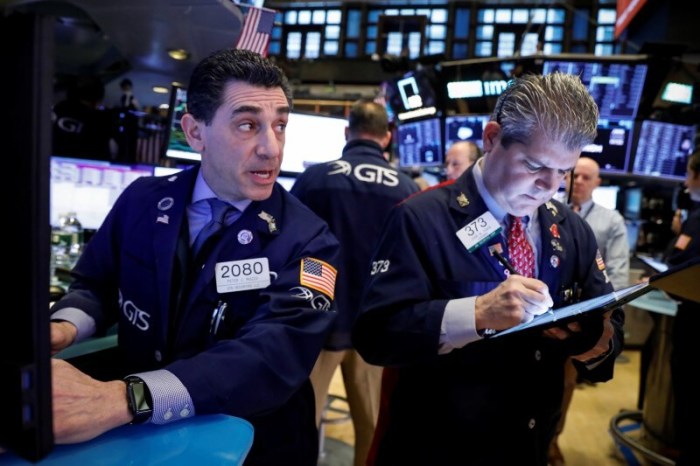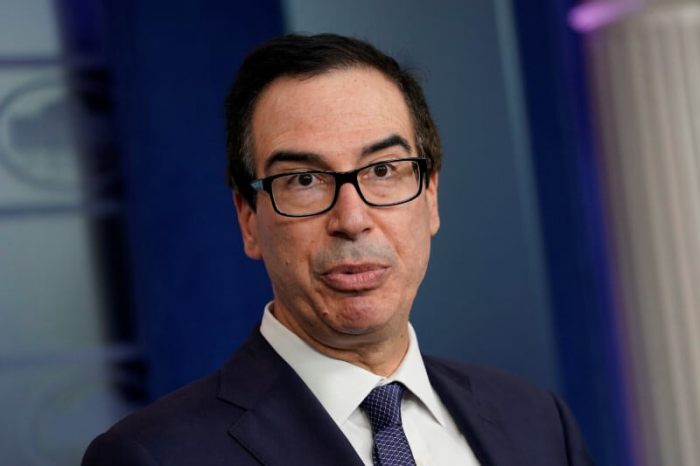By Balazs Koranyi and Francesco Canepa
FRANKFURT (Reuters) – The European Central Bank approved fresh stimulus measures on Thursday to help the bloc cope with the “major shock” of coronavirus but left interest rates on hold, dismaying markets, and said euro zone governments must lead the pandemic response.
ECB President Christine Lagarde told a news conference the virus would have a “significant impact on economic activity” even if it is ultimately temporary in nature and called for “an ambitious and coordinated fiscal policy response”.
With millions of people in lockdown, financial markets in freefall and companies struggling with disrupted supply chains, the ECB said it would give businesses more ultra-cheap loans, raise asset purchases and provide banks with capital relief.
Its bank supervisory arm also said it would temporarily drop capital requirements for lenders struggling with the effects of the virus.
Asked if a euro zone recession beckoned, Lagarde said the consequences for the economy would “clearly depend on the speed and strength” of the collective response to the epidemic, which euro zone governments should lead.
“I don’t think that anybody should expect any central bank to be the line of first response. It’s fiscal first and foremost,” Lagarde said.
The ECB said it would roll out cheap loans for banks, at an interest rate as low as minus 0.75%, and step up bond purchases by a total of 120 billion euros through the end of the year.
But the deposit rate will stay unchanged at a record low minus 0.5%, suggesting policymakers believe it may already be near the so-called reversal rate, where further cuts are counterproductive because they hurt bank margins to the point of thwarting lending.
The euro fell, Italy’s 10-year bond yields jumped to a seven-month high and stocks tumbled as markets expressed their disappointment at the package.
The ECB’s moves follow emergency rate cuts by the U.S. Federal Reserve and the Bank of England. Policymakers fear coronavirus could trigger a global recession and threaten the sort of disruption last seen in the 2008 financial crisis.
SYNCHRONISED MOVE
In an unprecedented synchronised move, the ECB’s bank supervisory arm said it will let euro zone banks fall short of some key capital and cash requirements, to keep credit flowing to the economy.
The European Union’s banking watchdog meanwhile said it has postponed this year’s stress test of lenders until next year. nL8N2B55B8]
“Banks need to be in a position to continue financing households and corporates experiencing temporary difficulties,” said Andrea Enria, the ECB’s chief supervisor.
The central bank kept the door open to further rate cuts, keeping its interest rate guidance unchanged.
“She (Lagarde) delivered what was the consensus. Markets that traded down pretty hard since then did so because clearly they wanted a lot more,” said Barnaby Martin, head of European credit strategy at Bank of America. “But we always knew that the ECB was further up against the political constraints of what they could do than other central banks.”
On Wednesday, the World Health Organization called the coronavirus a pandemic for the first time.
U.S. President Donald Trump meanwhile imposed restrictions for one month on travel to the United States from 26 European countries.
While policymakers insist the financial sector is sound and there will not be a repeat of the 2008 crisis, European stocks <.STOXX> have dropped 28% in the past few weeks and safe-haven German bond yields have tumbled to
SPEND, SPEND, SPEND
Lagarde, who has encouraged ECB staff to work from home if they wish to, has repeatedly warned governments that failure to act quickly on the virus could lead to calamity.
European Commission chief Ursula von der Leyen said in a tweet on Thursday that Brussels was working on responses including a “package to prop up the EU economy”.
Many economists expect Germany, Europe’s powerhouse, to be in recession in the first half of 2020 and some predict a similar outturn for the entire bloc.
While the ECB’s stimulus suggests it is keen to help, it has already used up its most powerful weapons in nearly a decade of stimulus. Interest rates are at record lows, it has gobbled up 2.6 trillion euros ($2.94 trillion) of mostly government debt, and has for years offered essentially free cash to banks to keep them lending.
Low rates may also be sowing the seeds of the next crisis as they compress bank margins and fuelling housing bubbles.
Compounding the ECB’s headache, oil prices have crashed, a double-edged sword for rate-setters.
While lower crude prices boost growth and consumer purchasing power through lower fuel prices, they also drag inflation sharply lower — a problem as the ECB has undershot its target of almost 2 percent since 2013.
Some economists expect inflation to fall to zero this spring if crude prices stay at current levels, raising fears of a damaging deflation spiral.
The ECB cut its quarterly growth forecasts for this year and next on Thursday but said the new estimates, which were collated before the coronavirus outbreak in Europe, were probably already out of date.
(Additional reporting by Madeline Chambers; Editing by Catherine Evans and Carmel Crimmins)























